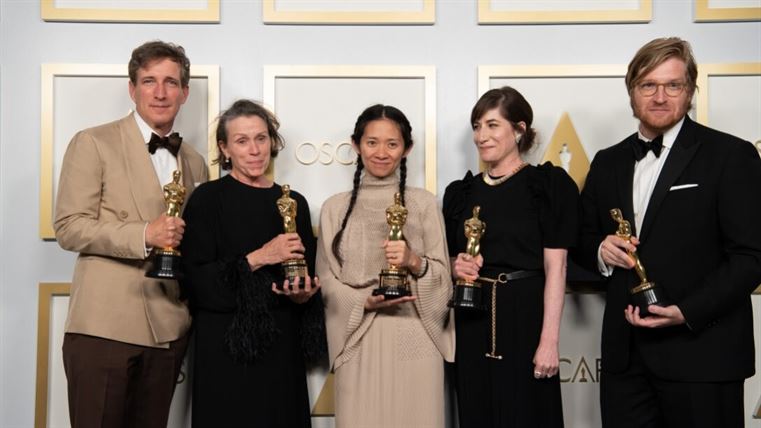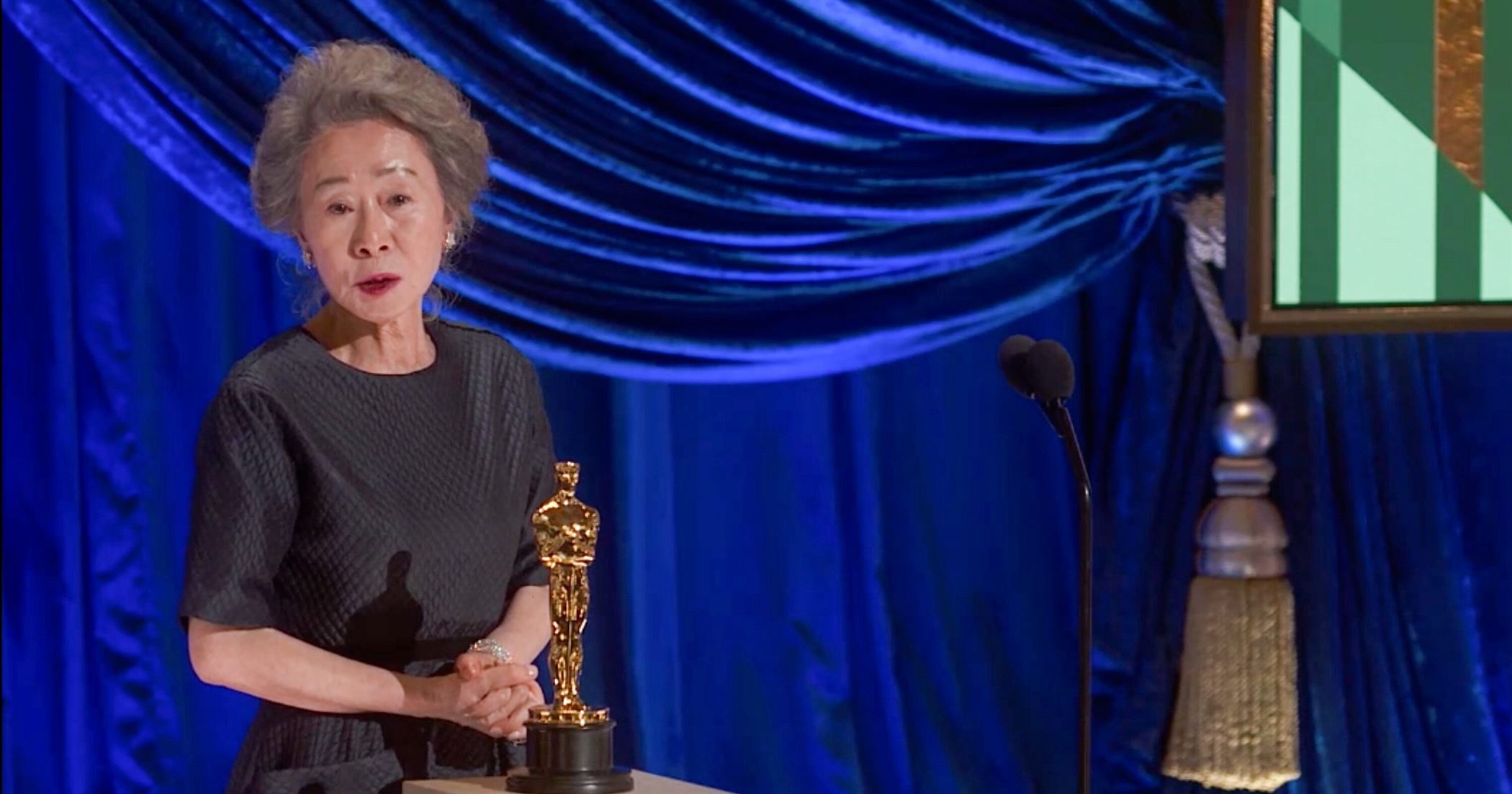The 93rd Academy Awards marked its first and hopefully last pandemic show, stepping away from its routine production.
It has been a difficult year for the film industry and avid moviegoers. Due to the coronavirus (COVID-19) pandemic, many have not been able to watch the most anticipated films of the year in the traditional theater environment and have resorted to streaming online.
Unlike other virtual awards shows this year such as the Golden Globes and the Independent Spirit Awards, the Academy Awards was held in person and had most of its presenters and nominees attend the show.
The show opened up with Regina King presenting the award for best original screenplay, which was awarded to Emerald Fennell for her feature film directorial debut, “Promising Young Woman.” Fennell became the first woman to win the award in 13 years after it was previously awarded to Diablo Cody for “Juno.”
https://www.youtube.com/watch?v=AxS4-EVhN2E
Daniel Kaluuya won the award for best supporting actor for his role as Fred Hampton, chairman of the Illinois chapter of the Black Panther Party, in Shaka King’s historical drama “Judas and the Black Messiah.” This is the first Oscar win of Kaluuya’s career.
The actor shouted out his fellow costar, LaKeith Stanfield, who was also a nominee for best supporting actor and dedicated words to Fred Hampton and the Black Panthers in his acceptance speech.
“[The Black Panther Party] showed me how to love myself,” Kaluuya said. “With that love, they overflowed into the Black community and into other communities. And they showed us that the power of unity that when they played divide and conquer, we say unite and ascend.”
The award for best director was announced early at this year’s ceremony to Chloé Zhao for “Nomadland,” making her the second woman to win in this category and the first woman of color to take home the Oscar.
In her speech, Zhao shared memories from her childhood of memorizing Chinese poems with her father, reciting a phrase for the audience.
“People at birth are inherently good,” Zhao translated. “This is for anyone that has the faith and the courage to hold on to the goodness in themselves and to hold on to the goodness in each other, no matter how difficult it is to do that. And this is for you. You inspire me to keep going.”
Another barrier was broken for Asian women this year with “Minari” actress Yuh-Jung Youn winning the award for best supporting actress. Youn was up against nominees such as eight-time nominated actress Glenn Close and award-winning actress Olivia Colman, among others.
Youn delivered a charming, clever and witty speech.
“I don’t believe in competition,” Youn said. “How can I win over Glenn Close? I’ve been watching so many of her performances. All the nominees, five nominees, we are the winners for different movies, we play different roles, so we cannot compete [with] each other. I have just a little bit of luck, maybe. I’m luckier than you. Also, maybe it’s American hospitality for the Korean actor.”
Disney’s “Soul” won the award for best original score. “My Octopus Teacher” won best documentary feature. Thomas Vinterberg’s “Another Round” won best international feature film. R&B artist H.E.R. won best original song for “Fight For You” in “Judas and the Black Messiah.”
This year, the performances of the best original song nominees was excluded from the main show but done during the pre-show which made for a lackluster and uninteresting ceremony by that point.
There were also few film clips played while each nominee was announced. If clips were added like they normally are, it would have given viewers a chance to get a glimpse of the films being presented if they missed out on watching them.
However, the ceremony did make time for a seven-minute game that felt like a drag. Questlove, who was the DJ for the night, took charge of a trivia game he called “Questlove’s Oscar Trivia.” With the help of actor and comedian Lil Rel Howery, they quizzed Hollywood’s top stars on their Oscar history knowledge.
https://www.youtube.com/watch?v=ToZKqQC_m18
Out of all the stars who participated, Glenn Close stole the spotlight as she did “Da Butt” which was a dance and song featured in Spike Lee’s “School Daze” (1988).
This year’s “In Memoriam” paid homage to the many talented individuals who have passed within the last year. Unlike montages from years passed, the memorial video felt rushed. Some names flashed for what seemed like less than a millisecond before rushing to the next.
Another unconventional turn that this year’s ceremony took was presenting the best picture category before that of best actress and best actor. Some viewers have speculated the change was made to award best actor to the late Chadwick Boseman at the end of the show. Many were disappointed with the buildup when Anthony Hopkins won for his role in “The Father.”
The award, which was presented by Joaquin Phoenix, was accepted by the Academy as Hopkins was not able to accept the award in person, making for an anticlimactic ending to the three-hour ceremony. According to his representatives, Hopkins offered to accept his Oscar via Zoom but was denied by the Academy.
Hopkins later uploaded his acceptance speech online from his homeland in Wales and went on to pay tribute to Boseman.
Prior to the best actor announcement, “Nomadland” won best picture. Zhao accepted the award alongside her team and dedicated the win to the nomadic community and everyone they met on the road while filming.
Frances McDormand, the star of “Nomadland,” pleaded to viewers to one day gather all their friends and head to the theaters to watch all the films that were represented at the ceremony.
“We give this one to our wolf,” McDormand said before she let out a hearty howl.

Daniel Kaluuya won the award for best supporting actor for his role in “Judas and the Black Messiah.”
Photo courtesy of AMPAS
The award for best actress in a leading role was presented by last year’s winner, Renee Zellweger, to McDormand, making her a three-time Academy Award-winning actress.
In a difficult year for the film industry and the world alike, the Academy Awards had its own trials and tribulations. With the lack of visuals to keep the audience entertained and allowing for most of its winners to speak without being cut off, the whole ceremony felt dull and monotonous.
ABC’s questionable production tactics and their gamble to present the best actor award at the end when the results were not yet known backfired grotesquely. The order of awards being rearranged from its routine was a disservice to the winners of best picture and best actor. Most importantly, viewers who had hoped for Boseman’s emotional win as a finale for the show made for one the year’s biggest upsets.
Despite this, history was made by women, particularly women of color, who became some of the Oscar’s firsts in their respective categories. With barriers such as these being brought down, more doors have been opened to aspiring women who dream of becoming screenwriters, actresses and directors.




